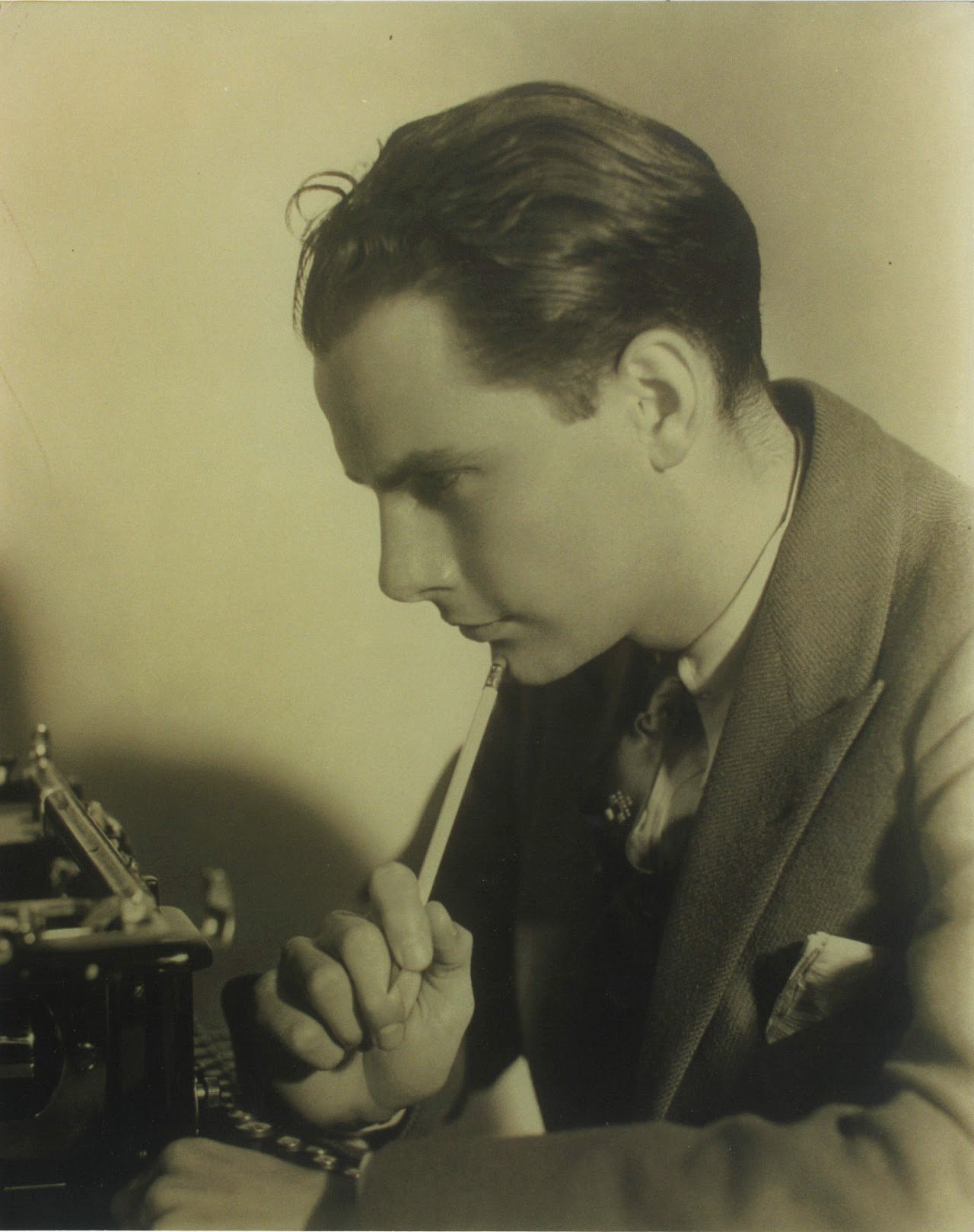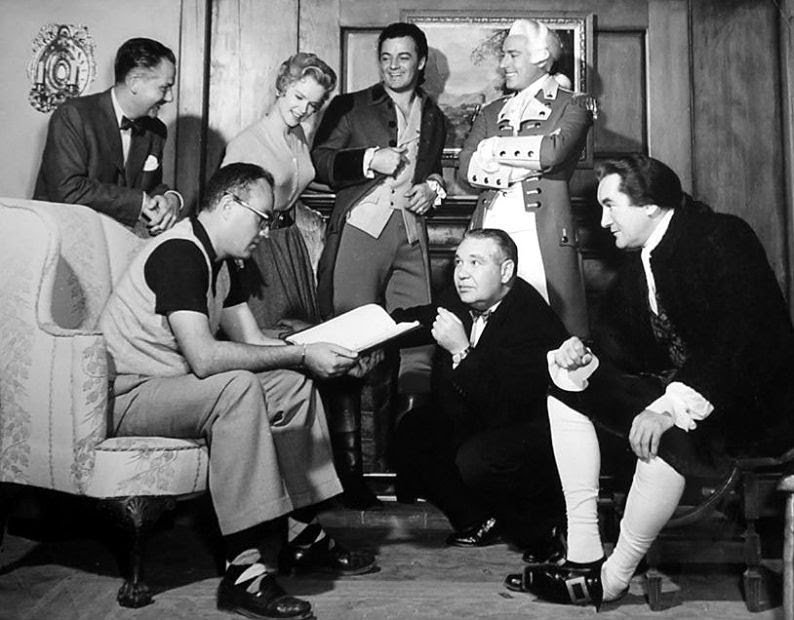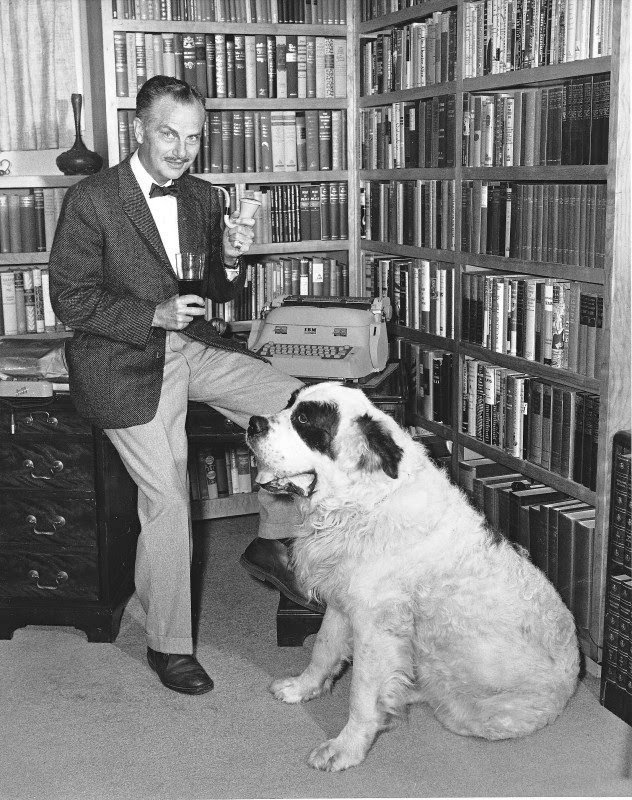
Karl Owen Tunberg
and His Contribution to Cinema
Karl Tunberg: photo taken between about 1946 and 1950.This Website is devoted to Karl Tunberg and his career as a screenwriter, and offers information about the more than forty major motion picture screenplays of which he was either co-author or sole author. Members of Karl Tunberg's family are creators and caretakers of this Website, and are making every effort to present the most accurate information available. The details offered here about Karl Tunberg's life, professional activities, and film credits have been derived from records kept by the Writer's Guild of America, legal documents, conversations with Karl Tunberg himself, information provided by family members, materials preserved in the Margaret Herrick Library of Motion Picture Arts and Sciences and other archives.
Karl Tunberg (extreme left) With Some of the Cast of The Scarlet Coat ca. 1955
K. Tunberg escorting daughter Jane, late 1950s
K. Tunberg young writer 1930s
K. Tunberg, late 1930s or about 1940
Aspiring writer early 1930s
Dining on the ocean liner Liberté early 1950s
On a motion picture industry publicity tour in Virginia 1950s
Karl Tunberg late 1950s or 1960s
Karl Owen Tunberg, the future screenwriter, was born in Spokane, Washington, on March 11, 1907 to Karl Emil Tunberg (1874-1962) and Centennial 'Cenna' Independence Firebaugh (1876-1967). Karl Owen had an older brother (of the same parents) named William, who also became a screenwriter as an adult. A brief word about Karl Owen's parents will not be out of place. Karl Emil was of Swedish ancestry, but born in America. His father, Alex E Tunberg (1852-1934), was actually born in Sweden, but as an early teenager migrated with his parents to Nebraska, U.S.A. Here the family settled, and Alex became a fairly prosperous farmer and later a businessman. Karl Owen's mother, Centennial 'Cenna' Independence Firebaugh, was born in Tolono, Illinois to William Firebaugh and Elizabeth Hay, and received her name from the fact she was born on 4 July, 1876 - the first centennial 'birthday' of the United States of America! Karl Emil and 'Cenna' married in 1904 and moved to Washington state, where they lived for a while, first in Spokane, then in Seattle. Then, perhaps about 1915, Karl Emil and 'Cenna' seem to have been separated. 'Cenna', with her two sons William and Karl, migrated to California.
The family lived for a time in Santa Barbara, but eventually settled in Los Angeles. There Karl attended Hollywood High School, UCLA and USC. Karl Tunberg was destined to spend much of his life in Los Angeles, though he also lived and worked for many years in London, England. Largely in connection with his film making projects, Karl also traveled throughout Europe, visited China, Malaysia, Japan, and the West Indies. He was married three times and had five children. He served as president of the Screen Writers Guild from 1950 to 1951.
His earliest writings included short stories, and a novel entitled While the Crowd Cheers, which was published in 1935 by the Macaulay Company. Very soon, Karl Tunberg turned his story-telling talents to screenplays. Starting in 1937 Karl was on contract as a screenwriter for Twentieth Century Fox Film Corporation under Darryl Zanuck. In the early 1940s Karl Tunberg moved his seat of operations to Paramount Pictures. In the first phase of his career Tunberg typically collaborated with other writers, especially with Darrell Ware, a deft composer of musical comedies. Eventually (in the later 1940s, the 1950s, and the 1960s) Karl worked more frequently on his own. In the late 1940s he made two films for Universal Studios, with a brief return to Fox (Love That Brute, 1950). This was followed by a series of large films for MGM in the 1950s, including historical epics such as Beau Brummel, the Scarlet Coat, and Ben Hur, and two big-production films for United Artists in the early 1960s (Taras Bulba [in collaboration with Waldo Salt], The Seventh Dawn). During this period he occasionally functioned as producer as well as writer – as in the case of Count Your Blessings (1958). In the 1960s Karl also wrote screenplays for two major MGM productions, I Thank a Fool (1962) and Where Were You When the Lights Went Out? (1967). Finally, in the early 1970s Karl Tunberg began writing segments for television series, but he never felt as much at home in the television medium as he had in the creation of large-screen motion pictures. The most famous screenplay authored by Karl Tunberg was probably the one he wrote for the 1959 epic, Ben Hur, but Karl Tunberg always told those close to him that he regarded Beau Brummel (1954) as his best work.
Motion Picture Credits
Sole Author:
Masquerade in Mexico. Karl Tunberg, 1945: story by Edwin Justus Mayer and Franz Spencer.
Directed by Mitchell Leisen: Starring Dorothy Lamour: Production Company Paramount Pictures
The Imperfect Lady. Karl Tunberg, 1946/1947: story by Ladislas Fodor.
Directed by Lewis Allen: Produced and written by Karl Tunberg: Starring Ray Milland, Teresa Wright, Cedric Hardwicke: Distributed by Paramount Pictures: Release date April 25, 1947
Up in Central Park. Karl Tunberg, 1948: with contributions by Iam McLellan Hunter, based on the musical play by Herbert Fields, Dorothy Fields, and Clyde Finch
Directed by William A. Seiter: Produced and written by Karl Tunberg: Starring Deanna Durbin, Dick Haymes, Vincent Price: Production Company Universal Pictures
View Synopsis and Analysis
You Gotta Stay Happy. Karl Tunberg, 1948: based on a serial by Robert Carson.
Directed by H.C. Potter: Produced and written by Karl Tunberg: Starring James Stewart, Joan Fontaine: Production Company Universal Pictures
View Synopsis and Analysis
Beau Brummell. Karl Tunberg, 1954: based on a play by Clyde Fitch.
Directed by Curtis Bernhardt: Produced by Sam Zimbalist: Starring Stewart Granger, Robert Morley, Elizabeth Taylor, Peter Ustinov: Production Company Metro-Goldwyn-Mayer
View Synopsis and Analysis
The Scarlet Coat. Karl Tunberg, 1955: based on a story by Hollister Noble and Sidney Harmon.
Directed by John Sturges: Produced by Nicholas Nayfack: Starring Anne Francis, George Sanders, Cornel Wilde, Michael Wilding: Production Company Metro-Goldwyn-Mayer
View Synopsis and Analysis
The Seventh Sin. Karl Tunberg, 1957: based on “The Painted Veil,” a novel by W. Somerset Maugham.
Directed by Ronald Neame: Starring Eleanor Parker, George Sanders, Bill Travers: Production Company Metro-Goldwyn-Mayer
Count Your Blessings. Karl Tunberg, 1959: based on “The Blessing,” a novel by Nancy Mitford.
Directed by Jean Negulesco: Produced and written by Karl Tunberg: Starring Rossano Brazzi, Maurice Chevalier, Deborah Kerr: Production Company Metro-Goldwyn-Mayer
Ben Hur. Karl Tunberg, 1959: based on a novel by Lew Wallace.
Directed by William Wyler: Produced by Sam Zimbalist: Starring Stephen Boyd, Hugh Griffith, Haya Harareet, Jack Hawkins, Charlton Heston: Production company Metro-Goldwyn-Mayer
Controversies over Screen-Writing Credit
View Synopsis and Analysis
I Thank a Fool. Karl Tunberg, 1962: based on a novel by Audrey Erskine Lindop.
Directed by Robert Stevens: Produced by Anatole de Grunwald: Starring Diane Cilento, Cyril Cusack, Peter Finch, Susan Hayward: Production companies De Grunwald Productions and Metro-Goldwyn-Mayer
View Synopsis and Analysis
The Seventh Dawn. Karl Tunberg, 1964: based on a novel by Michael Keon.
Directed by Lewis Gilbert: Starring Capucine, William Holden, Tetsuro Tamba, Susannah York: Production company United Artists
View Synopsis and Analysis
Harlow. Karl Tunberg, 1965.
Directed by Alex Segal: Starring Carol Lynley, Ginger Rogers, Barry Sullivan, Efrem Zimbalist Jr.: Production by Electronovision. Distributed by Magna Corporation.
Co-Author:
You Can't Have Everything. Harry Tugend, Karl Tunberg, Jack Yellen, 1937: based on a story by Gregory Ratoff.
Directed by Norman Taurog: Starring Don Ameche, Alice Faye: Production company 20th Century Fox
Life Begins in College. Karl Tunberg and Don Ettlinger, 1937: based on stories by Darrell Ware.
Directed by William A. Seiter: Starring Joan Davis, Tony Martin, Gloria Stuart, The Ritz Brothers: Production company 20th Century Fox
Sally, Irene and Mary. Don Ettlinger, Karl Tunberg, Jack Yellen, 1938: first made as a silent film in 1925: based on play by Eddie Dowling.
Directed by William A. Seiter: Starring Fred Allen, Joan Davis, Alice Faye, Tony Martin, Gregory Ratoff, Marjorie Weaver: Production company 20th Century Fox
Rebecca of Sunnybrook Farm. Don Ettlinger, Karl Tunberg, 1938: based upon the children's book Rebecca of Sunnybrook Farm by Kate Douglas Wiggin.
Directed by Allan Dwan: Starring William Demarest, Jack Haley, Bill Robinson, Randolph Scott, Shirley Temple, Helen Westley: Production company 20th Century Fox
Hold that Co-ed. Don Ettlinger, Karl Tunberg, 1938.
Directed by George Marshall: Starring John Barrymore, George Murphy, Marjorie Weaver: Production company 20th Century Fox
My Lucky Star. Screenplay by Harry Tugend and Jack Yellen, 1938: from a story by Don Ettlinger and Karl Tunberg.
Directed by Roy Del Ruth: Starring Richard Greene, Sonja Henie, Cesar Romero: Production company 20th Century Fox
Shipyard Sally. Don Ettlinger, Karl Tunberg, 1939-1940 : from a story by Gracie Fields, Thomas J. Geraghty, Val Valentine.
Directed by Monty Banks: Starring Gracie Fields, Sydney Howard, Norma Varden: Production company 20th Century Fox
I Was an Adventuress. Don Ettlinger, John O’Hara, Karl Tunberg, 1940 : based on a French film “J'étais une aventurière (1938)”.
Directed by Gregory Ratoff: Starring Richard Greene, Peter Lorre, Erich von Stroheim, Vera Zorina: Production company 20th Century Fox
Public Deb No. 1. Don Ettlinger, Karl Tunberg, Darrell Ware, 1940.
Directed by Gregory Ratoff: Starring Ralph Bellamy, Brenda Joyce, George Murphy: Production company 20th Century Fox
Down Argentine Way. Karl Tunberg, Darrell Ware, 1940 : based on a story by Rian James and Ralph Spence.
Directed by Irving Cummings: Starring Don Ameche, Betty Grable, Carmen Miranda: Production company 20th Century Fox
Tall, Dark, and Handsome. Karl Tunberg, Darrell Ware, 1941.
Directed by H. Bruce Humberstone: Starring Virginia Gilmore, Charlotte Greenwood, Caesar Romero: Production company 20th Century Fox
A Yank in the R. A. F. Karl Tunberg, Darrell Ware, 1941: from a story by Melville Grossman.
Directed by Henry King: Starring Betty Grable, Tyrone Power: Production company 20th Century Fox
Weekend in Havana. Karl Tunberg, Darrell Ware, 1941.
Directed by Walter Lang: Starring Alice Faye, Carmen Miranda, John Payne, Cesar Romero: Production company 20th Century Fox
My Gal Sal. Seton I. Miller, Karl Tunberg, Darrell Ware, 1942 : from a story by Theodore Dreiser.
Directed by Irving Cummings: Starring Rita Hayworth, Carole Landis, Victor Mature: Production company 20th Century Fox
Orchestra Wives. Karl Tunberg, Darrell Ware, 1942 : story by James Prindle.
Directed by Archie Mayo: Starring Lynn Bari, Marion Hutton, George Montgomery, Cesar Romero, Ann Rutherford: Production company 20th Century Fox
Lucky Jordan. Karl Tunberg, Darrell Ware, 1942 : story by Charles Leonard.
Directed by Frank Tuttle: Starring Alan Ladd, Sheldon Leonard, Helen Walker: Production company Paramount Pictures
Standing Room Only. Karl Tunberg, Darrell Ware, 1943 (released 1944?) : story by Al Martin.
Directed by Sidney Lanfield: Starring Paulette Goddard, Fred MacMurray: Production company Paramount Pictures
Dixie. Karl Tunberg, Darrell Ware, 1943: adapted by Claude Binyon; story by William Rankin.
Directed by A. Edward Sutherland: Starring Bing Crosby, Dorothy Lamour: Production company Paramount Pictures
Bring on the Girls. Karl Tunberg, Darrell Ware, 1945: story by Pierre Wolff.
Directed by Sidney Lanfield: Starring Eddie Bracken, Veronica Lake, Marjorie Reynolds, Sonny Tufts: Production company Paramount Pictures
The Shocking Miss Pilgrim. George Seaton, 1946 (in some sources the release date is given as 1947): story by Ernest Maas and Frederica Maas, with contributions to screenplay by Karl Tunberg and Darrell Ware.
Directed by George Seaton: Starring Betty Grable, Dick Haymes: Production company 20th Century Fox
Kitty. Karl Tunberg, Darrell Ware, 1945/1946: based on novel by Rosamund Marshall.
Directed by Mitchell Leisen: Starring Paulette Goddard, Ray Milland: Production company Paramount Pictures
Love that Brute. Karl Tunberg, Darrell Ware, 1950: with contributions by John Lee Mahin.
Directed by Alexander Hall: Starring Joan Davis, Paul Douglas, Jean Peters, Cesar Romero, Keenan Wynn: Production company 20th Century Fox
Night into Morning. Leonard Spigelgass, Karl Tunberg, 1951.
Directed by Fletcher Markle: Starring Nancy Davis, John Hodiak, Ray Milland: Production company Metro-Goldwyn-Mayer
The Law and the Lady. Leonard Spigelgass, Karl Tunberg, 1951: based on the play “The Last of Mrs. Cheyney,” by Frederick Lonsdale.
Directed by Edwin Knopf: Starring Greer Garson, Fernando Lamas, Michael Wilding: Production company Metro-Goldwyn-Mayer
Because You’re Mine. Leonard Spigelgass, Karl Tunberg, 1952: based on a story by Ruth Brooks Flippen and Sy Gomberg.
Directed by Alexander Hall: Starring Mario Lanza, Doretta Morrow, James Whitmore, Bobby Van: Production company Metro-Goldwyn-Mayer
Scandal at Scourie. Norman Corwin, Leonard Spigelgass, Karl Tunberg, 1953: based on a story by Mary McSherry.
Directed by Jean Negulesco: Starring Donna Corcoran, Greer Garson, Walter Pidgeon: Production company Metro-Goldwyn-Mayer
Valley of the Kings. Robert Pirosh, Karl Tunberg, 1954: inspired by Gods, Graves and Scholars by C. W. Ceram.
Directed by Robert Pirosh: Starring Eleanor Parker, Robert Taylor: Production company Metro-Goldwyn-Mayer
Libel. Anatole de Grunwald and Karl Tunberg, 1959: based on a play by Edward Wooll.
Directed by Anthony Asquith: Starring Dirk Bogarde, Olivia de Havilland, Wilfrid Hyde-White, Paul Massie, Robert Morley: Production company Metro-Goldwyn-Mayer
Taras Bulba. Waldo Salt and Karl Tunberg, 1962: based on a novel by Nikolai Gogol.
Directed by J. Lee Thompson: Starring Yul Brynner, Tony Curtis: Production company Harold Hecht Productions & United Artists
Where Were You When the Lights Went Out. Everett Freeman and Karl Tunberg, 1968: based on a play by Charles Magnier.
Directed by Hy Averback: Starring Lola Albright, Jim Backus, Doris Day, Robert Morse, Patrick O'Neal, Terry Thomas: Production company Metro-Goldwyn-Mayer
Television Credits
How do I Love Thee. Everett Freeman and Karl Tunberg, 1968: based on book by Peter Devries.
Woman in the Shadows (Mannix). Karl Tunberg, 1971.
Frenzy (Bonanza). Karl Tunberg and Preston Wood, 1971.
The Moving Target (Mannix). Karl Tunberg, 1971.
Murder by Moonlight (Cannon). Karl Tunberg, 1972.
Doctor and Mister Harper (Medical Center). Karl Tunberg, 1972.
Tio Taco, M.D. (Medical Center). Karl Tunberg, 1972.
End of the Line (Medical Center). Karl Tunberg, 1972.
A Life at Stake (Medical Center). Donald Brinkley and Karl Tunberg, 1973.
Edge of the Web (Mannix). Karl Tunberg and Terence Tunberg, 1974.
The Quasar Kill (Cannon). Karl Tunberg and Terence Tunberg, 1975.
Interception (Bronk). Karl Tunberg and Terence Tunberg, 1975.
A Home is not a House (Movin' On). Jimmy Sangster, Karl Tunberg and Terence Tunberg, 1975.
The Drone (Spencer's Pilots). Karl Tunberg and Terence Tunberg, 1976.
The Crop Duster (Spencer's Pilots). Karl Tunberg and Terence Tunberg, 1976.
The Curandero (The Blue Knight). Karl Tunberg and Terence Tunberg, 1976.
The Cult (Kingston). Karl Tunberg and Terence Tunberg, 1977.
In Hot Weather the Crime Rate Soars (Lanigan's Rabbi). Karl Tunberg and Terence Tunberg, 1977.
Hitch-hiking Hitch (Chips). Bruce Shelly, Karl Tunberg and Terence Tunberg, 1978







